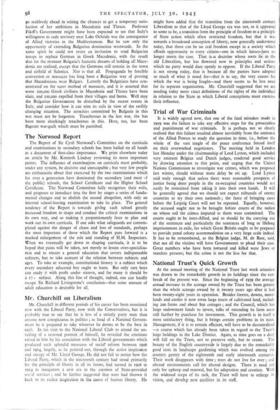The Norwood Report
The Report of Sir Cyril Norwood's Committee on the curricula and examinations in secondary schools has been hailed on all hands as a document of first-class importance. We print elsewhere today an article by Mr. Kenneth Lindsay reviewing its more important points. The influence of examinakons on curricula must probably, under any system, be decisive and =escapable; but very few people are enthusiastic about that exercised by the two examinations which for over a generation have dominated the secondary (and most of the public) schools, the School Certificate and the Higher School Certificate. The Norwood Committee fully recognises. their evils, and proposes to introduce into the first by stages a series of funda- mental changes and to abolish the second altogether, with only an internal school-leaving examination to take its place. The general tendency of the Report is towards giving each school greatly increased freedom to shape and conduct the critical examinations in its own way, and so making it proportionately freer to plan and work out its own curricula. If one asks what safeguards are contem- plated against the danger of chaos and loss of standards, perhaps the most important of those which the Report puts forward is a marked enlargement of the role and standing of H.M. Inspectors. 'Chen we eventually get down to shaping curricula, it is to be hoped that pains will be taken, not merely to lessen over-specialisa- tion and to ensure a general education that covers indispensable subjects, but to take account of the relation between subjects and ages. To take an example, constitutional history is a subject which every secondary educated boy ought to learn. But only rare boys can study it with profit under sixteen, and for many it should be a 17 + subject. Along this line of thought, indeed, one can hardly escape Sir Richard Livingstone's conclusion—that some amount of adult education is desirable for all.






















 Previous page
Previous page